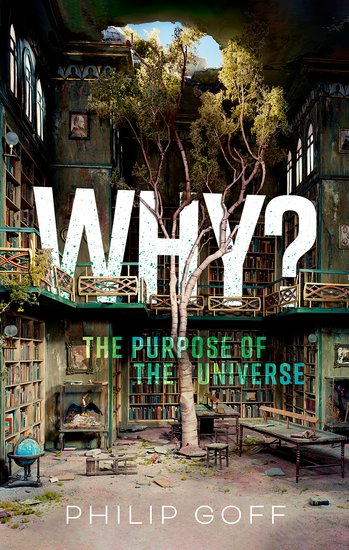BOOKS
Why? The Purpose of the Universe (2023)
Why are we here? What's the point of existence? On the big questions of meaning and purpose, Western thought has been dominated by the dichotomy of traditional religion and secular atheism. In Why ? The Purpose of the Universe (Oxford University Press), I argue that it's time to move on from both God and atheism. Through an exploration of contemporary cosmology and cutting-edge philosophical research on the nature of consciousness, I argue for cosmic purpose: the idea that the universe is directed towards certain goals, such as the emergence of intelligent life.
In contrast to religious thinkers, I argue that the traditional God is a bad explanation of cosmic purpose. Instead, I explore a range of alternative possibilities for accounting for cosmic purpose, from the speculation that we live in a computer simulation to the hypothesis that the universe is itself a conscious mind.
Ultimately, I outline a way of living in hope that cosmic purpose is unfolding, involving political engagement and a non-literalist interpretation of traditional religion.
Praise for Why?
"fascinating...an enjoyable read" - Brian Clegg, Popular Science
"It takes a sort of cosmic chutzpah to announce that your book is going to explain the purpose of the universe, and that predisposed me in its favour before I even began to read the text. But what I enjoyed most was the author's calm and level-headed approach to that fundamental question: Why? I suppose it's the question most young people begin with when they start to develop intellectual curiosity, as well as being the source of every system of religion and of science as well. Philip Goff explains that 'purpose' is not some emotional human need with little ultimate importance, but a quality that seems to be built into the very nature of things. It's nothing less than thrilling to follow his argument, and to regain that sense of connectedness that's so important not just to our well-being, but to our very survival." - Philip Pullman
"This book is a tour de force. If you have ever wondered what the point is in living, whether the universe itself has any purpose (and if it does, whether that is best explained by the existence of God), why the universe exists at all for that matter, what the nature of consciousness is and how it fits into the universe as a whole, this is the book for you. Written in an engaging and easy to follow style, Goff presents a highly original, unified, and thought-provoking world view. It is rare to read anything that makes one seriously question one's basic assumptions about reality. Goff's book does just that. The result is something head spinning. I cannot recommend it highly enough." - Michael Tye, Professor of Philosophy, The University of Texas at Austin
"Am I here by accident? Is there a purpose? This is contentious territory in science and philosophy. Goff offers a lucid and riveting account of key ideas, data, and theories. He then, with a rare audacity, blazes new trails. It is fascinating terrain to explore, and Goff proves an expert and genial guide." - Donald Hoffman, Professor of Cognitive Science, University of California, Irvine
"The best metaphysical pictures help us fulfill three aims: give us a sense of the world and how we as human beings fit within it, provide an ethical guide, and help us make some peace with our condition. Philip Goff's brilliant new book Why? The Purpose of the Universe does all three by making a compelling case for teleological cosmopsychism. With this unique position that is neither God nor atheism, Goff gives us a glimpse of the immense creative potential of the universe. He outlines an attractive picture of spiritual belonging and practice in a godless world that is far from nihilistic." - Helen De Cruz, Danforth Chair in the Humanities, Saint Louis University
"It might sound surprising, but the progress of physics, astronomy and cosmology in recent decades has raised important questions about the meaning and purpose in the universe, and of the universe. "Nature has been kinder to us than we had any right to expect", wrote Freeman Dyson in 1971, "it almost seems as if the universe must in some sense have known that we were coming". So, what now? Philip Goff has provided a discussion of these important issues that is informed, accessible, original and entertaining. This is a book worth reading, and worth thinking hard about." - Luke Barnes, Lecturer in Astronomy and Cosmology, Western Sydney University
"Why? is a terrific book. For a work in philosophy, it is unusually fun to read. Goff clearly has a gift for making rigorous philosophy accessible to a broad audience. Part of his genius is the way he weaves his main arguments into a narrative about his own intellectual journey." - Paul Draper, Professor of Philosophy, Purdue University
"Why? is simultaneously accessible and profound, comprehensible to the general reader and full of novel ideas sure to challenge professional philosophers. Goff offers an intriguingly weird vision of the cosmos, neither atheistic nor orthodox, pushing beyond the boundaries of both ordinary scientific thinking and ordinary religious apologetics." - Eric Schwitzgebel, Professor of Philosophy, University of California, Riverside
"A brilliant book! Goff takes us to the edges of physics and philosophy to make a compelling case for cosmic purpose. The presentation is clear, innovative, and provocative. True to form, Goff's ideas are not anchored to convention or tradition, but he instead lights a torch on an original path of discovery. I came away feeling that Goff's work contributes to the purpose of the universe in a profound and beautiful way. I highly recommend this book to anyone interested in the big question of why we are here and what life might be about." - Josh Rasmussen, Associate Professor of Philosophy. Azusa Pacific University
"What's the meaning of life? Raw science tells us we live in an uncaring universe, devoid of purpose and oblivious to the wants and needs of humans. Or does it? In this new book, Goff explores purpose in the cosmos, not a purpose rooted in religion, but in a conscious fabric of the universe itself. Whilst Goff and I have argued over the implications of cosmological fine-tuning and the statistics of typing monkeys, the contents will certainly make you think about life and its meaning." - Geraint Lewis, Professor of Astrophysics, Sydney Institute for Astronomy, the University of Sydney
"One of the most persuasive panpsychists." - Stephen Fry
"Why? makes a succinct, ambitious case for a new, secular view of cosmic purpose." - Isaac Randel, Foreword Reviews
"Why? is designed to appeal both to a wide audience who know little about philosophy or physics and to academics who know the relevant technical terms and literature... It is an exciting and challenging book." - Richard Swinburne, TLS
"An ingenious and accessible discussion of a big question we'll never answer - the reason for our existence... a rich book... It'll turn quite a few heads." - Galen Strawson, The Guardian
"I would strongly recommend this book as a clear, well-argued, and undogmatic example of analytical philosophy at its best." - Keith Ward, Church Times
Galileo's Error (2019)
How does the brain produce consciousness, that inner world of colours, sounds, smells and tastes that each of us know every second of waking life?
Galileo's Error: Foundations for a New Science of Consciousness traces the problem of consciousness back to the foundations of the scientific revolution, in Galileo's decision to set consciousness outside of the domain of science. I argue that in order to solve the problem of consciousness we need to rethink what science is.
It's an accessible introduction to the philosophy of consciousness, laying out the key theories and ultimately arguing for panpsychism: the view that consciousness pervades the universe and is a fundamental feature if it. I also explore the implications of panpsychism for the meaning of human existence.
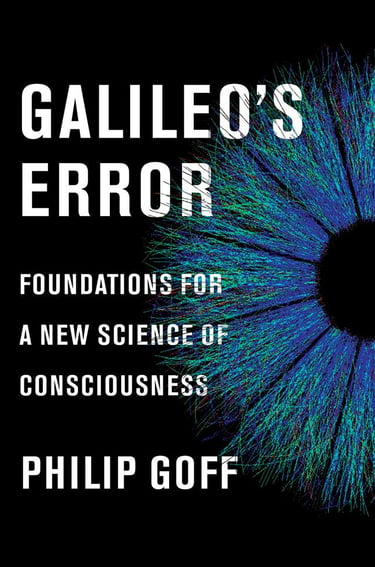

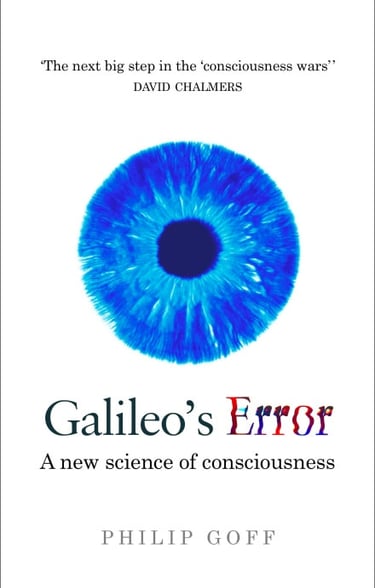

Praise for Galileo's Error
This is one of the clearest accounts I've ever read about the mystery of consciousness, and the way in which one theory about it, panpsychism, does a great deal to explain how it occurs and what it is. Why shouldn't consciousness be a normal property of matter, like mass or electrical charge? This idea has the glorious simplicity of our first realisation that the earth goes around the sun, and not vice versa. Suddenly the universe appears in a new and much more revealing perspective. Philip Goff's book is altogether a splendid introduction to this fascinating idea - Philip Pullman, author of the His Dark Materials
Philip Goff's new book, Galileo's Error, introduces the public to a revolutionary approach to one of the most stubborn of mysteries: how does the brain, with its chemical and electrical processes, give rise to a mind, whose thoughts, emotions, colours and tones we apprehend directly? In this provocative, brave and clearly written book, Goff makes a compelling case for an initially absurd thesis: that the colours we perceive are instances of universal qualities hidden within all material processes - Lee Smolin, Perimeter Institute for Theoretical Physics
Galileo's Error is a manifesto for a new generation of philosophers who think we need to revise our view of the physical world to accommodate consciousness. Galileo took the mind out of matter, which was good for the science of matter but not so good for the science of the mind. Philip Goff thinks that to explain consciousness, we have to put the mind back into matter. His ideas are radical, but his arguments are rigorous and the book is a pleasure to read. I recommend it to anyone who wants to come to grips with mystery of consciousness - David Chalmers, New York University
In Galileo’s Error, Philip Goff argues for a new approach to the scientific study of consciousness. He offers an accessible and compelling analysis of why our felt experience continues to elude scientific explanation and why the theories that describe consciousness as a fundamental feature of matter have been neglected—and why they now deserve serious consideration. This is a must-read for anyone interested in the future of consciousness studies - Annaka Harris, New York Times bestselling author of CONSCIOUS: A Brief Guide to the Fundamental Mystery of the Mind
Galileo’s Error is wonderful introduction to this ancient set of beliefs and how panpsychism can give rise to a naturalized form of spirituality that can overcome the alienation we all feel in today’s globalized world that is beginning to fracture - Christof Koch, President and chief scientist of the Allen Institute for Brain Science
Galileo’s Error is a tour de force. Goff defends his distinctive view of consciousness with verve, wit and authority, and for good measure adds an even-handed account of alternative views and a graphic introduction to the surrounding science. It is hard to imagine a better introduction to current debates about consciousness - David Papineau, King's College London/City University New York
Philip Goff has written an extraordinarily accessible and entertaining book introducing and defending an increasingly popular, if on the face of it outlandish, claim: that consciousness is everywhere. Matter doesn’t somehow magically become conscious depending on how it’s arranged; rather the consciousness is there from the start. There’s no better introduction to this fascinating subject - Stephen Law, Editor of Think
Goff's elegant book offers a thought provoking, inspiring picture of the nature of mind. His spirited defense of panpsychism moves well beyond the usual academic discussions, mulling over our place in the larger universe - Susan Schneider, University of Connecticut
Galileo's Error is an exciting and provocative book, which argues for the revolutionary view that all matter is conscious. Goff writes with clarity and passion, and whether you agree or disagree with his conclusions, you will find his book enjoyable, engaging, and deeply thought-provoking - Keith Frankish, Honorary Reader in Philosophy, University of Sheffield
Is Consciousness Everywhere?(2022)
This volume consists of responses to my book Galileo's Error: Foundations for a New Science of Consciousness by scientists, philosophers, and spiritual thinkers. Contributors include Carlo Rovelli, Sean Carroll, Lee Smolin, and Christof Koch. In a final essay, I respond to all of the contributions.
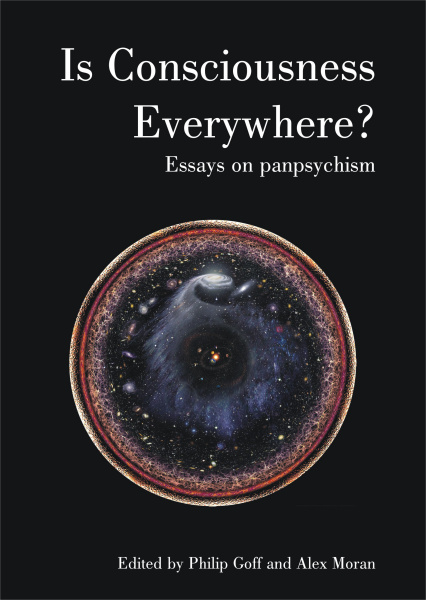

Consciousness and Fundamental Reality (2017)
This is my academic book on the philosophy of consciousness, which was published by Oxford University Press in 2017. It is a core text in the 'new wave' of panpsychist approaches to consciousness in recent academic philosophy. The paperback is coming out in November.
The book has a negative half and a positive half
The Negative Half - I argue that physicalist views cannot account for the evident reality of conscious experience, and hence that physicalism cannot be true. I also argue that there are big problems with the most well-known arguments against physicalism and propose significant modifications.
The Positive Half - I then explore and defends a theory of fundamental reality known as 'Russellian monism.' Bertrand Russell argued that physics, for all its virtues, gives us a radically incomplete picture of the world and tells us only about the extrinsic, mathematical features of material entities, and not how they are in and of themselves. Following Russell, my version of Russellian monism argues that it is this 'hidden' intrinsic nature of matter that explains human and animal consciousness.
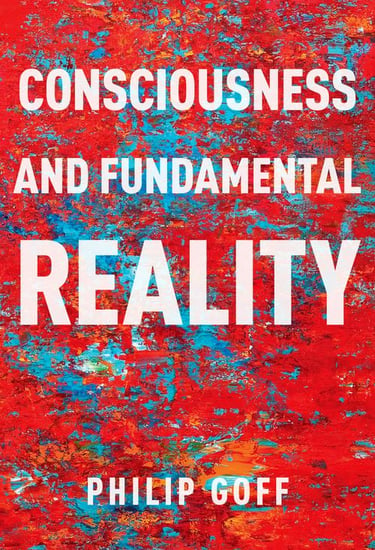

Praise for Consciousness and Fundamental Reality:
This book contains some of the most important contributions to the metaphysics of consciousness in recent years. Philip Goff develops a sophisticated argument against materialism, and then explores the prospects for radical alternatives in considerable depth. He makes a strong case for panpsychism, the thesis that consciousness exists at a fundamental level of physical reality, and extends this to a case for cosmopsychism, the thesis that the universe as a whole is conscious. Anyone interested in the philosophical problem of consciousness should pay close attention to his ideas - David Chalmers, New York University
Goff has produced a grand piece of speculative metaphysics, in the tradition of Leibniz, Spinoza and Unger. It is also probably the best single piece of work emerging from the recent bloom of interest in Russellian monist views of consciousness. Starting with plausible and well-defended premises, he argues for a daring conclusion that many will find difficult to accept; yet, he makes a compelling case that there is no easy way to resist it. Figuring out how to respond to his rigorous and thorough arguments will be highly instructive (and fun!) for anyone with an interest in metaphysically-oriented philosophy of mind - Geoffrey Lee, University of California, Berkeley
This book will quickly become a reference point for philosophical discussions of consciousness. Philip Goff lays out the issues with precision and cuts through to the heart of the latest philosophical technicalities. He also writes beautifully and advances a number of strikingly novel theses. No philosopher interested in consciousness can afford to ignore Consciousness and Fundamental Reality - David Papineau, King's College London and City University New York
In an era of increasing specialization and “small ball” philosophy, Philip Goff’s Consciousness and Fundamental Reality comes as a welcome antidote. He defends a grand metaphysical vision of the world, constitutive cosmopsychism, according to which the universe as a whole is conscious, and everything else is grounded in its evolving conscious state. Yes, this view is revisionary. But all views on the mind-body problem are revisionary – including orthodox physicalism. Goff develops a number of powerful arguments against the alternatives as well as a positive case for his cosmopsychism. His discussion demands – and will repay – our close attention - Adam Pautz, Brown University

